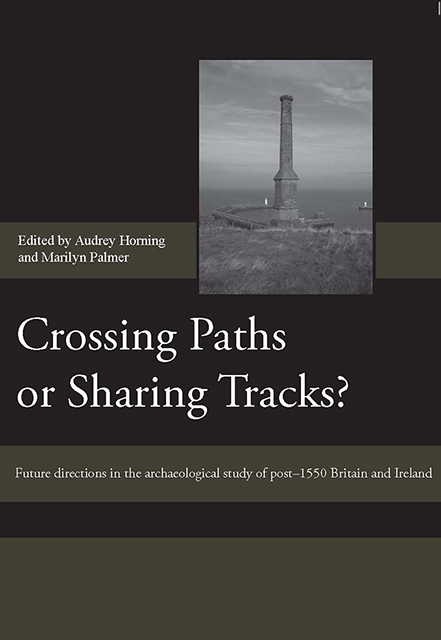 Crossing Paths or Sharing Tracks?
Crossing Paths or Sharing Tracks? Irish ‘Post-Medieval’ Archaeology: Time to Lose our Innocence?
Published online by Cambridge University Press: 07 March 2023
Summary
Those of us on this side of the Atlantic who choose to describe our field as historical archaeology rather than post-medieval archaeology generally buy into two ideas. One is that ‘historical archaeology’ connotes a complex, ideologically rationalised, praxis; it is not simply the archaeological study of the historically recorded past. The second is that historical archaeology's study area is the entire world; no matter how local our focus, global patterns will still be visible and critical. I subscribe happily to these views, but I also argue that in Ireland, where the field is relatively new, we use this consensus as a platform on which to develop a more nuanced, place-specific, dimension to historical-archaeological philosophy and practice.
INTRODUCTION
This chapter is essentially an opinion piece. The first part of its title signals, through the use of inverted commas, a scepticism that is shared by an increasing number of British archaeologists but by fewer Irish archaeologists than some of us would like. The phrase ‘post-medieval’ carries the imprimaturs of two of the general-archaeological organisations – the long-established Society for Post-Medieval Archaeology and the more youthful Irish Post-Medieval Archaeology Group – represented at the conference of which these are the proceedings. But, such support notwithstanding, it is a phrase that deserves to be surrounded by the flashing lights of inverted commas, lest it remain naturalised, withits implications for how we approach the modern and contemporary pasts loitering unnoticed under the radar of critical thinking about archaeology and its conceptualisation of historic time. Some may argue that a discussion of the appropriateness of the term ‘post-medieval’ is no more than an exercise in semantic hair-splitting, and maybe even that it is a waste of time when so much remains to be done. However, as long as there is a possibility that our subject is weakened conceptually, or has its vision limited, by the retention of a term that was coined at its birth, the critique of ‘post-medieval’ as a construct is valid. Moreover, a conference (and book) subtitled Future directions in the archaeological study of post-1550 Britain and Ireland is precisely the context in which we should look around our house and see what needs to be put in order.
The second part of my title borrows its phraseology from a New Archaeologist.
- Type
- Chapter
- Information
- Crossing Paths or Sharing Tracks?Future directions in the Archaeological Study of Post-1550 Britain and Ireland, pp. 65 - 80Publisher: Boydell & BrewerPrint publication year: 2009
